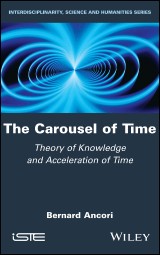Details
The Carousel of Time
Theory of Knowledge and Acceleration of Time1. Aufl.
|
139,99 € |
|
| Verlag: | Wiley |
| Format: | EPUB |
| Veröffentl.: | 05.12.2019 |
| ISBN/EAN: | 9781119681502 |
| Sprache: | englisch |
| Anzahl Seiten: | 304 |
DRM-geschütztes eBook, Sie benötigen z.B. Adobe Digital Editions und eine Adobe ID zum Lesen.
Beschreibungen
<p>Based around the image of a carousel, this book uses epistemological theory to tackle the paradoxical acceleration and deceleration of time that is experienced by many. The consequence of this paradox is the observance of the past, present and future coinciding, where acceleration is combined with perfect immobility. <i>The Carousel of Time</i> proposes a model that focuses on a complex network of individual actors, and their relation to the analysis, structure and evolution of our socio-cognitive space–time. The first part of the book, "Foundations", presents the key bases of this model, as well as the notions that must be understood and integrated. The book then analyzes the concept of "Space", defining the parameters of the network’s boundaries, and finishes with an exploration of "Time". This third part links the temporality of the network to its spatial characteristics and studies its evolution.</p>
<p>Foreword ix</p> <p>Acknowledgments xv</p> <p>Introduction xvii</p> <p><b>Part 1. Foundations </b><b>1</b></p> <p><b>Chapter 1. Information, Communication and Learning </b><b>3</b></p> <p>1.1. Claude Shannon’s model 4</p> <p>1.1.1. Ralph Vinton Hartley, Claude Shannon’s forerunner 5</p> <p>1.1.2. Claude Shannon’s formula and the two fundamental theorems of telegraphic communication 6</p> <p>1.1.3. The eight main characteristics of the Shannonian theory of communication 9</p> <p>1.2. Gregory Bateson’s model 11</p> <p>1.2.1. The immanent mind and the Batesonian definition of information 11</p> <p>1.2.2. The Batesonian categorization of learning 13</p> <p>1.2.3. The eight main characteristics of Batesonian communication theory 16</p> <p><b>Chapter 2. Self-organization and Natural Complexity </b><b>23</b></p> <p>2.1. Self-organization and information creation 23</p> <p>2.2. Meaning of information in a hierarchical system 31</p> <p>2.2.1. Order from noise versus organizational noise 31</p> <p>2.2.2. Complexity and complication 33</p> <p>2.2.3. Meaning of information in a hierarchical system 36</p> <p><b>Chapter 3. Human Memory as a Self-organized Natural System </b><b>41</b></p> <p>3.1. The theory of functional localization or invented memory 42</p> <p>3.1.1. The theory of functional localization 42</p> <p>3.1.2. Against functional localization 45</p> <p>3.2. Neural Darwinism and inventive memory 47</p> <p><b>Chapter 4. Hypotheses Linked to the Model </b><b>63</b></p> <p>4.1. Six hypotheses relating to the structure of the network 64</p> <p>4.2. Eight hypotheses relating to the evolution of the network 70</p> <p>4.2.1. Assumptions related to inter-individual communication 71</p> <p>4.2.2. Hypotheses related to intra-individual cognition 74</p> <p><b>Part 2. Space </b><b>81</b></p> <p><b>Chapter 5. Scope, Dimensions, Measurements and Mobilizations </b><b>83</b></p> <p>5.1. Inter-individual communication and learning 85</p> <p>5.2. Categorization and learning 92</p> <p>5.2.1. The creative analogy of weak novelty: the example of Planck’s formula 95</p> <p>5.2.2. The creative analogy of radical novelty: Gregory Bateson’s “grass syllogism” 101</p> <p><b>Chapter 6. Provisional Regionalization and Final Homogenization </b><b>113</b></p> <p>6.1. Formation of clusters of actors and regionalization of the network space 114</p> <p>6.2. Instability and erasure of regions within the network 124</p> <p>6.3. Evolution of information production at the level of the global network and at the level of each cluster of actors 132</p> <p><b>Part 3. Time </b><b>141</b></p> <p><b>Chapter 7. Propensities to Communicate, the Specious Present and Time as Such, the Point of View from Everywhere and the Ancestrality’s Paradox </b><b>143</b></p> <p>7.1. Propensities to communicate and the specious present 144</p> <p>7.2. Subjective time, objective time and time as such 151</p> <p>7.3. A point of view from nowhere or a point of view from everywhere? 156</p> <p>7.4. On an alleged “ancestrality’s paradox” 161</p> <p><b>Chapter 8. Déjà-vu and the Specious Present </b><b>171</b></p> <p>8.1. A history of interpretations of the déjà-vu phenomenon 172</p> <p>8.2. Déjà-vu and the specious present: an interpretation 179</p> <p><b>Chapter 9. The Acceleration of Time, Presentism and Entropy </b><b>187</b></p> <p>9.1. Historical time, irreversibility and end of time 188</p> <p>9.2. On the sensation of acceleration of time and presentism 193</p> <p>9.2.1. A psychological interpretation of the acceleration of time 193</p> <p>9.2.2. A socio-historical interpretation of the acceleration of time 197</p> <p>9.3. Irreversibility of time and entropy of the network 202</p> <p>9.3.1. A brief presentation of the genesis of the entropy concept 203</p> <p>9.3.2. The entropy law and network trajectory 205</p> <p>9.3.3. Entropy theory and trajectory of the complex socio-cognitive network of individual actors 209</p> <p><b>Chapter 10. Temporal Disruptions </b><b>213</b></p> <p>10.1. The translation of beliefs 216</p> <p>10.2. Revisions of beliefs and the possible worlds semantics 219</p> <p>10.3. The weak transformation of beliefs: learning and normal science 222</p> <p>10.4. The radical transformation of beliefs: learning and scientific revolution 226</p> <p>Conclusion 235</p> <p>References 249</p> <p>Index 269</p>
<p><b>Bernard Ancori</b> is Professor Emeritus of Epistemology and History of Science at the University of Strasbourg, and Researcher at The Henri Poincaré Archives – Philosophy and Research on Science and Technology, France.</p>


















